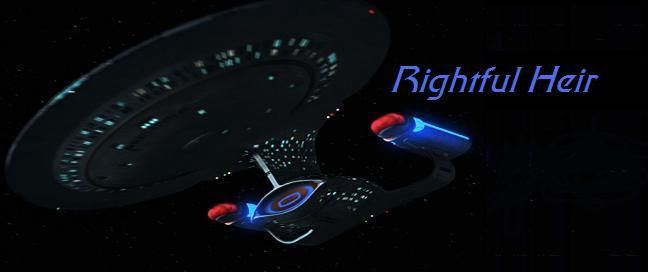
Worf misses the beginning of his shift and as Riker and Picard investigate into why they discover that Worf is having something of a crisis of faith ever since he spoke of the Klingon writings of Kahless (Klingon Jesus) to the young people he rescued at a Romulan interment camp a few episodes ago. Worf has begun questioning his own "faith" and has tried to summon visions but has been unsuccessful. Picard admonishes Worf for neglecting his duties but seems to otherwise understand Worf's troubles. He recommends Worf seeks his answers at (Klingon Jerusalem) and return to the ship ready to perform his duties.
After spending several days praying and trying to get visions, Word is prepared to leave when one of the Klingon overseers of the temple helps guide Worf in how to get his visions. Worf tries again only to have Kahless return before him.
Only this isn't a Kahless vision and is instead a living being, supposedly Kahless having resurrected in order to help lead the Klingons back onto the path of righteousness, er, honor.
Worf is initially skeptical but is soon convinced after Kahless shows some prowess with a batleth and knows of things from the sacred texts known only to the highest order of the Klingon faith structure. Worf becomes a born-again Kahlesstian and is ready to help Kahless to unite all Klingons onto a new path of glory.
Gowron, the Klingon Chancellor, is not so quick to hand the Empire over and arranges to meet with Kahless before allowing knowledge of his resurrection to become widespread. He intends to test and challenge his claims as he doesn't believe this is truly a resurrected Kahless. He brings with him a knife that supposedly has the "original" Kahless's blood on it (I dunno... the Klingon Shroud of Turin?) Tests performed by Crusher show that the blood on the knife and the blood on the man before them is a perfect match.
Gowron is still not as convinced but Worf's faith is only solidified as he is now ready for this new era and pleas with Gowron to submit. Gowron still refuses saying that the Klingon Religious Right have been trying to thwart him and letting "Kahless" return to the homeworld will disrupt his reign and may inspire a new civil war. He goes so far with his belief that he challenged Kahless to a battle and easily wins. Showing that this Kahless is not the great, unbeatable, warrior he's supposed to be.
Worf confronts the religious leaders and they fess-up that this is not the "real" Kahless. Instead it's a clone created from remaining genetic material they had available and he's been imbibed with the sacred texts so he knows of Kahless's writings and teachings. Unfortunately this couldn't fill stuff they don't have answers to or Kahless' experiences in Sto-vo-kor.
Worf's faith is again crushed and he begins laughing at this, and Gowron is only too happy to reveal this notion to prevent the upset this could cause. But Worf worries that the idea of Kahless is powerful enough to split the Klingon people should Gowron reject him and this could lead to greater problems. Instead it's suggested Gowron give Kahless an honorary position in the Klingon hierarchy, allowing him to teach and inspire people to follow the Empire while Gowron continues to lead. Gowron agrees and life goes on.
------
Eh, it's an okay episode. I actually find the episodes centered around the Klingon mythology/theology to be pretty interesting and it's interesting how "thought out" it all is. More-so the religion or culture of most other Trek races with exception of the Bajorans through DS9.
It is interesting how at one point the Klingon religious leaders ask Worf how does he know if the prophecies of Khaless's return meant a literal resurrection or the artificial one they constructed here.
This episode does show some more of the dents in the armor of the Klingon government that becomes such a big thing in DS9.
Beyond that, not much to really say on this episode. It's interesting but at the same time I'm not too moved or entertained by episodes with religious undertones or themes.

